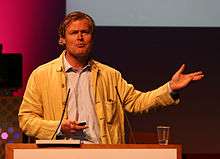Gunter Pauli

Gunter Pauli (born 1956 in Antwerp) is a self-styled "serial entrepreneur", author and initiator of The Blue Economy. Le Point, The Huffington Post, and The Tasmanian Times have called him "The Steve Jobs of Sustainability" [1] [2] [3]
Life and Business
Gunter Pauli was born in 1956. He is a graduate from St. Ignatius Loyola's University in Belgium, Economics (1979) and obtained his MBA from INSEAD (1982) in Fontainebleau, France. He also has an honorary master in Systemic Design from the Politecnico di Torino (Italy) and an honorary doctorate in economics from the University of Pecs (Hungary). Pauli has lived on 4 continents, is fluent in 7 languages and is a resident of Japan since 1994. He is married to Katherina Bach and is the father of 5 sons and 1 (adopted) daughter.
He has been active as an entrepreneur, lecturer, and commentator in culture, science, politics, sustainability innovation, and the environment.
He built the first ecological factory when Chairman and CEO of Ecover, that under his leadership became a worldwide acclaimed ecological building, being completed in 1992.
Literary career
His first book was the biography of Dr. Aurelio Peccei, founder of the Club of Rome, whose assistant he was from 1979 to 1984.[4] Since then he has written 20 books printed in 34 languages, and 125 fables for children. Some estimate that 90 million copies of his fables have been distributed worldwide.
In 1989 he was elected as an independent substitute to the European Parliament but never took up the seat.
In 1991 Gunter Pauli was the founder of the "Mozarteum Belgicum", founder (1988) and president of Worldwatch Europe (until 1992).
In 1994 Pauli initiated the Zero Emissions Research Initiative (ZERI), which was named Zero Emissions Research and Initiatives[5] in 1997. The ZERI work started in Tokyo with the support of the Japanese Government and the United Nations University (UNU) and targeted redesigning production and consumption into clusters of industries inspired by natural systems.
He later wrote the book The Blue Economy, which was originally a report to the Club of Rome that became a commercial book. He wrote this book with the twin aims of stimulating entrepreneurship while setting up new and higher standards towards sustainability, where the good for our health and the environment is cheap. The book includes the principles that support the Blue Economy concept and also one hundred business cases that follow the principles. The goals set for the Blue Economy as a Business Model are high: To create 100 million jobs and substantial capital value through 100 innovations in the 2010-2020 decade.
He has written 200 fables reaching out to children. He converts the hundreds of implemented projects for which he mobilized €4 billion in investment capital into introductions to science, emotional intelligence, the arts, connected thinking and entrepreneurship.
Publications
- International Marketing: The Importance of Image in Japan. Sophia University Press, 1983, ISBN 978-4-88168-094-0
- Aurelio Peccei: Portrait of the Founder of the Club of Rome. Pergamon Press, 1987, ISBN 0-08-034861-0
- Services: the driving force of the economy. Waterlow Press, 1987, ISBN 978-0-08-033091-4
- Towards a United Europe: 1992 and Beyond - Shaping Priorities for Successful Regional Integration. SRI International, 1990, OCLC Number 22733850
- The Second Wave: Japan's Global Assault on Financial Services (with Richard Wright). Waterlow Press, 1997, ISBN 978-0-312-01558-9
- Steering Business towards Sustainability (with Fritjof Capra). United Nations University Press, 1995, ISBN 978-0-585-20025-5
- Breakthroughs: What Business can Offer Society'. Epsilon Press, 1996, ISBN 978-1-900820-00-4
- Upsizing: The Road to Zero Emissions. Greenleaf, 1998, ISBN 978- 1874719182
- Out of the Box: 21 ways to be creative and innovative at work. Future Managers, 2004, ISBN 978-1-920019-40-2
- Upcycling. Riemann Verlag (Munich), 1999, ISBN 978-3-570-50006-4
- The Blue Economy. Paradigm Publishers, 2010, ISBN 978-0-912111-90-2 [6]
References
- ↑ http://www.lepoint.fr/invites-du-point/idriss-j-aberkane/idriss-j-aberkane-gunter-pauli-le-steve-jobs-du-developpement-durable-26-09-2014-1866831_2308.php
- ↑ http://www.huffingtonpost.fr/idriss-j-aberkane/abolition-de-la-pollution_b_5746362.html
- ↑ http://tasmaniantimes.com/index.php/article/its-time-to-work-blue
- ↑ "Ten Nobels for the Future http://www.hypothesis.it/nobel/eng/bio/pauli.htm". External link in
|title=(help) - ↑ "Zero Emissions Research and Initiatives http://zeri.org/". ZERI. External link in
|title=(help) - ↑ The Blue Economy. Paradigm Publications. May 2008.
External links
- Gunter Pauli's Home Page
- The Club of Rome
- Zero Emissions Research and Initiatives
- The Blue Economy
- Gunter Pauli: Bhutan and the Blue Economy (video of a lecture held at Schumacher College)
- Gunter's Fables
- Gunter's Fables
- Gunter Pauli Live auf dem Entrepreneur Summit 2014 on YouTube